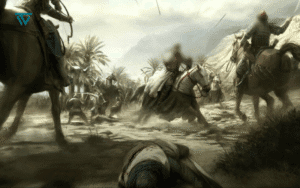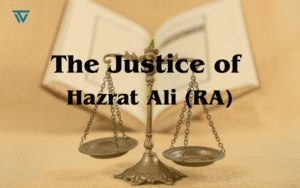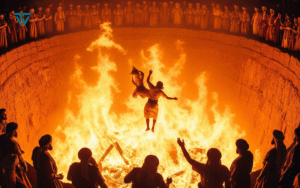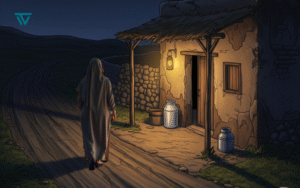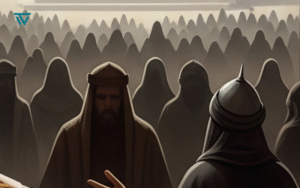A Story of Honesty and Forgiveness in Islam

It was the golden age of the second Caliph of Islam, the lion-hearted Umar ibn al-Khattab (may Allah be pleased with him). During this era, the very air of Medina was fragrant with the scent of justice, a core principle that works alongside the profound concept of forgiveness in Islam. Far from this city, however, in a barren desert region of Arabia, lived a strong and truthful young man. A pressing family matter consequently set him on a journey to Medina. For this daunting task, his only companion was a sturdy and loyal camel, which was his sole means of crossing the vast, arduous desert.
Traveling day and night, the young man pressed onward. The fierce sun beat down on him from above, while miles of hot sand stretched out in every direction. When exhaustion finally began to overwhelm him, he stopped to rest beside a date garden. The sight of the lush greenery was a relief to his tired eyes. Therefore, he let his beloved camel graze freely and took shelter in the cool shade of a tree, where he soon fell into a deep slumber.
A Blaze of Anger and the Ultimate Triumph of Forgiveness in Islam
An older gardener had nurtured the date garden with the utmost care. In fact, each sapling was as dear to him as his own child. Consequently, while working in his garden that day, he was horrified to see an unfamiliar camel trampling and destroying several saplings he had so carefully planted. Unable to bear this destruction, the old gardener became consumed by rage. He quickly grabbed a nearby stone and threw it at the camel, intending only to drive it away.
Unfortunately, misfortune followed. The stone missed its mark and instead struck the camel squarely in the chest. Writhing in agony, the innocent animal collapsed and died right there. The gardener had never imagined that a moment’s anger could lead to such a devastating outcome. As a result, his body trembled with remorse and fear. It was then that he noticed the sleeping young man. Rushing over, he confessed his mistake and, with a quivering voice, begged for forgiveness.
When the young man heard the news of his dear camel’s death, it felt like the sky was crashing down on him. This camel was not just his companion on this long journey; it was also a source of livelihood for his family. Overwhelmed by grief and rage, he completely lost his sense of reason. He seized the frail, older gardener by the beard and shook him violently. The old man, unable to withstand the shock, also collapsed and breathed his last.
Judgment in the Caliph’s Court
In an instant of fury, two lives were lost. As soon as the young man came to his senses, the gravity of his actions hit him, and he broke down in tears. Meanwhile, the gardener’s sons arrived at the scene. After they heard the young man’s account, they took him to the court of Caliph Umar (RA) for judgment.
The Caliph’s court was filled with people. A solemn silence pervaded the assembly, a testament to the profound respect that Umar’s (RA) presence commanded. He listened intently as both sides presented their case. Without hiding a single detail or resorting to falsehoods, the young man openly confessed his crime. The Caliph was deeply impressed by his candidness and truthfulness. However, the law of Islam stood above personal admiration. Therefore, in accordance with the Quranic injunction of “a life for a life,” he pronounced the death sentence.
Upon hearing the verdict, the young man remained calm and composed. “Commander of the Faithful,” he said peacefully, “I accept the decree of Allah and your command. However, I have one final request before I die. I have some unsettled debts and final responsibilities to my family. Grant me just three days, and I promise I will bid them a final farewell and return.”
The Caliph replied, “Your request could be granted, but only if someone from this assembly will stand as your guarantor. Remember, if you fail to return, your guarantor will be executed in your place.”
An incredible silence fell over the court. Who would risk their own life for this unknown, condemned man? The young man’s desperate eyes scanned the crowd, searching for a guarantor. In that tense moment, one of the Prophet Muhammad’s (PBUH) most beloved companions, Abu Dharr al-Ghifari (RA), rose from the crowd. In a resonant voice, he declared, “O Commander of the Faithful, I will be this young man’s guarantor. Let him be given the chance to fulfill his final wish.”
With the guarantee secured, the young man raced back home. His family, including his newlywed wife and aging parents, was anxiously awaiting him. When they heard what had happened, a wave of grief swept through the household. Fearing for his life, they all begged him not to go back. But for the young man, his promise was more precious than life itself.
Ignoring his family’s pleas, he appeared back in the Caliph’s court, covered in dust, at the very last moment of the appointed day. His incredible integrity left the Caliph, the crowd, and even the gardener’s sons speechless.
The Caliph then turned to the gardener’s sons and asked for their decision. The young man’s unwavering commitment to his promise had clearly melted their hardened hearts, leading them to an incredible act of grace. In a unified voice, they declared, “O Commander of the Faithful, we will not seek revenge for our father’s death. We choose to show this truthful young man the mercy inherent in forgiveness in Islam.”
A look of joy illuminated the Caliph’s face. He called for Abu Dharr al-Ghifari (RA) and asked, “O beloved companion of the Prophet! Why did you risk your life for a complete stranger?”
Abu Dharr al-Ghifari (RA) replied, “O Caliph of the Muslims! I saw the light of truth in his face. The way he fearlessly confessed his crime told my heart that while this man might fear death, he could never break a promise. Indeed, his truthfulness was the foundation of my trust.”
This powerful incident remains an eternal example of honesty and justice, and it perfectly illustrates the profound beauty of forgiveness in Islam.
